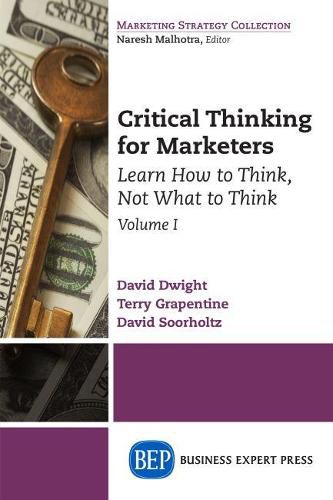Readings Newsletter
Become a Readings Member to make your shopping experience even easier.
Sign in or sign up for free!
You’re not far away from qualifying for FREE standard shipping within Australia
You’ve qualified for FREE standard shipping within Australia
The cart is loading…






This title is printed to order. This book may have been self-published. If so, we cannot guarantee the quality of the content. In the main most books will have gone through the editing process however some may not. We therefore suggest that you be aware of this before ordering this book. If in doubt check either the author or publisher’s details as we are unable to accept any returns unless they are faulty. Please contact us if you have any questions.
All marketing actions, whether preceded by formal or informal decision-making processes, are based on what philosophers call
arguments.
An argument is a set of related statements comprising premises and a conclusion. Ideally, premises give an audience good reasons for accepting your argument’s conclusion. In marketing, these
conclusions
are normative decisions about what an organization should do, for example, raise prices by five percent, add a new sales territory or, perhaps, change the marketing communications mix to invest more in digital and less in print. The premises are the rationale behind why the organization should take such actions. Critical Thinking for Marketers: Learn How to Think, Not What to Think provides information and guidelines on not only how to develop good arguments, but also what it means to develop a good argument. For example, the book describes two basic kinds of arguments-deductive and inductive-and how to examine whether such arguments are
good
or not. To do this, the book explains 60 logical fallacies-or errors in reasoning-that marketers should avoid. Additionally, the authors’ several
Think Better
discussions examine how fields such as philosophy, behavioral economics, and marketing theory have informed the principles of critical thinking in marketing.
$9.00 standard shipping within Australia
FREE standard shipping within Australia for orders over $100.00
Express & International shipping calculated at checkout
This title is printed to order. This book may have been self-published. If so, we cannot guarantee the quality of the content. In the main most books will have gone through the editing process however some may not. We therefore suggest that you be aware of this before ordering this book. If in doubt check either the author or publisher’s details as we are unable to accept any returns unless they are faulty. Please contact us if you have any questions.
All marketing actions, whether preceded by formal or informal decision-making processes, are based on what philosophers call
arguments.
An argument is a set of related statements comprising premises and a conclusion. Ideally, premises give an audience good reasons for accepting your argument’s conclusion. In marketing, these
conclusions
are normative decisions about what an organization should do, for example, raise prices by five percent, add a new sales territory or, perhaps, change the marketing communications mix to invest more in digital and less in print. The premises are the rationale behind why the organization should take such actions. Critical Thinking for Marketers: Learn How to Think, Not What to Think provides information and guidelines on not only how to develop good arguments, but also what it means to develop a good argument. For example, the book describes two basic kinds of arguments-deductive and inductive-and how to examine whether such arguments are
good
or not. To do this, the book explains 60 logical fallacies-or errors in reasoning-that marketers should avoid. Additionally, the authors’ several
Think Better
discussions examine how fields such as philosophy, behavioral economics, and marketing theory have informed the principles of critical thinking in marketing.